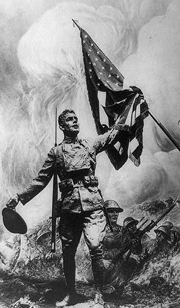David Brooks tells us that Islam harbors evil:
Most people select stories that lead toward cooperation and goodness. But over the past few decades a malevolent narrative has emerged.
That narrative has emerged on the fringes of the Muslim world. It is a narrative that sees human history as a war between Islam on the one side and Christianity and Judaism on the other. This narrative causes its adherents to shrink their circle of concern. They don’t see others as fully human. They come to believe others can be blamelessly murdered and that, in fact, it is admirable to do so.
Elsewhere in the news:
Roeder told reporters that the killing of Dr. George Tiller was necessary because it protected the lives of unborn children.
“Because of the fact preborn children’s lives were in imminent danger this was the action I chose. … I want to make sure that the focus is, of course, obviously on the preborn children and the necessity to defend them,” Roeder said.
“Defending innocent life — that is what prompted me. It is pretty simple,” he said.
During the 30 minute interview, Roeder did not apologize for his role in the death of Dr. Tiller. “No, I don’t have any regrets,” he said.
Let us also mention the many recent examples of media personalities and elected officials encouraging people to commit acts of violence to enforce a right-wing agenda. Recently members of the Westboro Baptist Church cult stood outside Sasha and Malia Obama’s school with signs saying “God is your enemy.”
Humans tend to be frightened of other peoples’ crazy uncles but to ignore our own. I think moderates in the Muslim world are way too tolerant of Muslim extremists, but you can say exactly the same thing about Christian and right-wing extremists in our culture. Flame throwers like Michelle Malkin, Michelle Bachmann, etc. are weaving the narrative that there is virtue in using guns to enforce one’s political agenda when elections go against you. Christian “Dominionists” also push the worldview that human history is a war between Christianity — or their version of it, anyway — and everyone else, with Christianity destined to triumph.
It is only a tiny step between such rhetoric and the belief that others can be blamelessly murdered and that, in fact, it is admirable to do so. Scott Roeder is one who took that step.
Brooks also disagrees with people who, Brooks says, “absolved” Maj. Nidal Malik Hasan’s responsibilities in the Fort Hood shootings by speculating that he was suffering some sort of emotional or mental breakdown. “The possibility of Islamic extremism was immediately played down. This was an isolated personal breakdown, not an ideological assault, many people emphasized.”
Personally, I don’t think there’s an either-or choice between “personal breakdown” and “Islamic extremism.” Show me an ideological or religious extremist of any sort, and I’ll show you someone who is seriously maladjusted. Which might have come first is something of a chicken-and-egg question, but often someone turns to extremism after suffering some personal breakdown, either acute or chronic.
Erich Fromm wrote that people who find autonomy isolating and bewildering often will submerge themselves in an authoritarian group. And Eric Hoffer wrote,
Only the individual who has come to terms with his self can have a dispassionate attitude toward the world. Once the harmony with the self is upset, he turns into a highly reactive entity. Like an unstable chemical radical he hungers to combine with whatever comes within his reach. He cannot stand apart, whole or self-sufficient, but has to attach himself whole-heartedly to one side or the other.
I have a long disagreement with people who think that looking for a psychological “cause” to a heinous act is somehow making excuses for the perpetrator. I say we’re all crazy, in one way or another, and our first moral responsibility is to deal with our own craziness. People who turn to violence or some kind of self-destruction, like drugs, as a reaction to their psychological flaws (short of psychosis) are not “excused.”
The real cop-out is to explain heinous acts the way Brooks does, by filing them under “evil.” Evil, to Brooks, is an inherent quality that some people have and others don’t, or maybe it’s an infection, like a virus. Brooks writes,
The conversation in the first few days after the massacre was well intentioned, but it suggested a willful flight from reality. It ignored the fact that the war narrative of the struggle against Islam is the central feature of American foreign policy. It ignored the fact that this narrative can be embraced by a self-radicalizing individual in the U.S. as much as by groups in Tehran, Gaza or Kandahar.
It denied, before the evidence was in, the possibility of evil. It sought to reduce a heinous act to social maladjustment. It wasn’t the reaction of a morally or politically serious nation.
What Brooks doesn’t seem to grasp is that “evil” is not separate from “social maladjustment,” emotional pain, fear, hate, anger, etc. What people call “evil” are acts committed by people who are allowing their maladjustments to jerk them around. Understanding that is not about “absolving” anyone, but about understanding ourselves. To simply blame “evil” is not morally or politically serious, just medieval.

